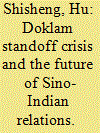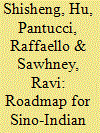| Srl | Item |
| 1 |
ID:
076491


|
|
|
| 2 |
ID:
158774


|
|
|
| 3 |
ID:
133840


|
|
|
|
|
| Publication |
2014.
|
| Summary/Abstract |
The current international order, especially regionally speaking is chaotic, with the following four main features:
First, the great game between the US and China is the key driver behind contemporary change to the international order. Both China and the US are big powers with global influence : One is the biggest power trying to maintain the status quo while the other is the biggest emerging power- according to world bank's latest report of April 30, 2014, China is predicted to becomes the world's largest economic entity in 2014 on the basis of purchasing power parity (PPP).
|
|
|
|
|
|
|
|
|
|
|
|
|
|
|
|
| 4 |
ID:
132042


|
|
|
|
|
| Publication |
2014.
|
| Summary/Abstract |
A NATO and Western powers begin to take a backseat in Afghanistan 's future, one of the most pressing questions is what role the region can play in helping Afghanistan to become a prosperous and stable nation. Numerous efforts are already underway through multilateral and bilateral forums, yet the key to regional cooperation for Afghanistan' s future lies through closer interaction between Beijing and New Delhi. Drawing on a research project spanning a number of workshops in Beijing, New Delhi and Qatar and involving influential thinkers and experts from China, India, the UK and Afghanistan, this paper will try to map out specific ideas that policymakers in Beijing and New Delhi can explore as avenues of cooperation. Post-2014 Afghanistan will remain a major regional concern for at least the short to medium term. The earlier China and India can develop workable collaborative undertakings, the sooner they can forge a stable and prosperous neighbourhood.
|
|
|
|
|
|
|
|
|
|
|
|
|
|
|
|